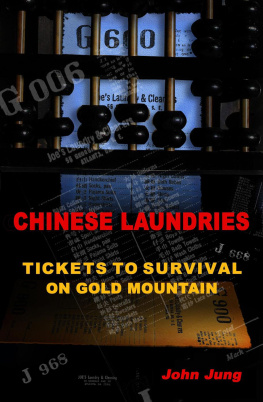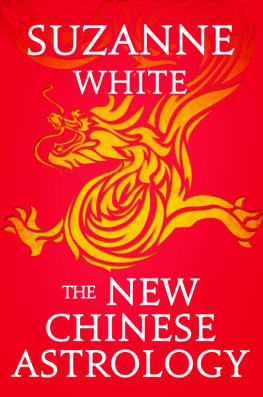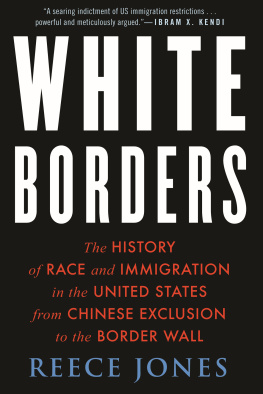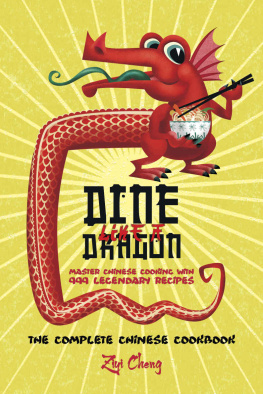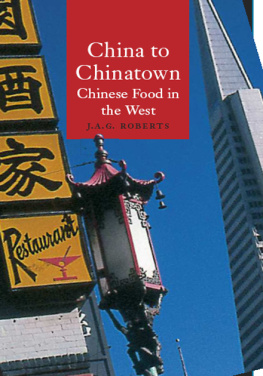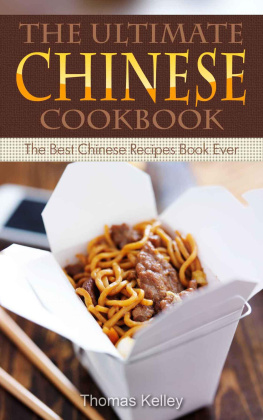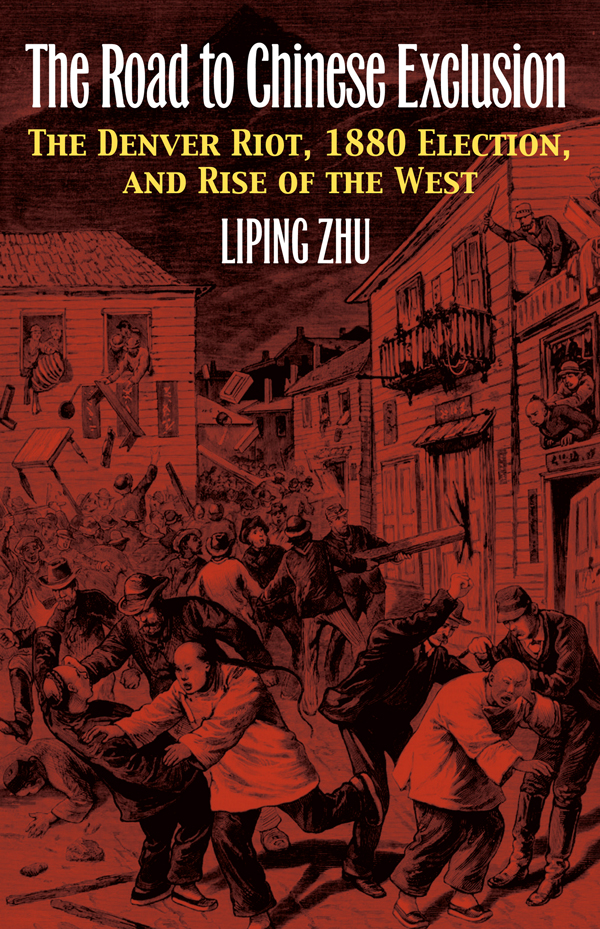Contents
THE ROAD TO
CHINESE EXCLUSION
THE ROAD TO
CHINESE EXCLUSION
THE DENVER RIOT, 1880 ELECTION,
AND RISE OF THE WEST
LIPING ZHU

2013 by the University Press of Kansas
All rights reserved
Published by the University Press of Kansas (Lawrence, Kansas 66045), which was organized by the Kansas Board of Regents and is operated and funded by Emporia State University, Fort Hays State University, Kansas State University, Pittsburg State University, the University of Kansas, and Wichita State University
Library of Congress Cataloging-in-Publication Data
Zhu, Liping.
The road to Chinese exclusion : the Denver riot, 1880 election, and rise of the West / Liping Zhu.
pages cm
Includes bibliographical references and index.
ISBN 978-0-7006-1919-1 (cloth : alk. paper)
ISBN 978-0-7006-2027-2 (ebook)
1. ChineseLegal status, laws, etc.United StatesHistory19th century. 2. United StatesEmigration and immigrationGovernment policyHistory19th century. 3. ChineseColoradoDenverSocial conditions19th century. 4. Denver (Colo.)Race relationsHistory19th century. 5. ElectionsUnited States1880. 6. West (U.S.)Politics and government19th century. I. Title.
E184.c5z484 2013
978.88302dc23
2013011041
British Library Cataloguing-in-Publication Data is available.
Printed in the United States of America
10 9 8 7 6 5 4 3 2 1
The paper used in this publication is recycled and contains 30 percent postconsumer waste. It is acid free and meets the minimum requirements of the American National Standard for Permanence of Paper for Printed Library Materials z39.48-1992.
To Joanna and Alex
CONTENTS

Chapter 1
The Chinese Question
Chapter 2
Chinese Coloradans
Chapter 3
The Election of 1880
Chapter 4
The Denver Riot
Chapter 5
Justice Denied
Chapter 6
The Great Compromise
ILLUSTRATIONS

MAPS
PHOTOGRAPHS
TABLES
ACKNOWLEDGMENTS

It is my obligation to acknowledge all the institutions and individuals who have helped me in various ways during the past eight years of producing this book. For financial support, I am grateful to Eastern Washington University, which provided a sabbatical and several generous summer research grants. The College of Social and Behavioral Sciences and Social Work of Eastern Washington University and Dean Vickie Shields offered necessary assistance to the project. My colleagues James Kieswetter and Kathleen Huttenmaier were very kind and generous in sharing some of their faculty development funds when my own were exhausted. The history department as a whole has always been very supportive as well.
Throughout my research, the staff members of many archives and libraries provided their professional and courteous assistance, which made all of my visits productive and enjoyable. I specifically would like to thank Nan J. Card, Gilbert Gonzalez, John Ransom, Merv Hall, and Becky Hill of the Rutherford B. Hayes Presidential Center; Janice Prater, Kay Wisnia, Bruce Hanson, Colleen Nunn, and James Jeffrey of the Denver Public Library; Erin McDanal, George Orlowski, Elena Cline, Lance Christensen, James Chipman, and Paul Levit of the Colorado State Archives; Rebecca Lintz, Ruba Sadi, Karyl Klein, and Debi Neiswonger of the Colorado State Historical Society (now History Colorado); Molly Otto of the Colorado State Capitol; Eric Bittner of the National Archives at Denver; and Peter Blodgett of the Huntington Library. I also want to express a large debt of gratitude to the many librarians and archivists who assisted me at the Library of Congress; the National Archives at College Park, Denver, and Seattle; the New York Public Library; the New York Historical Society; the Missouri Historical Society; the Bancroft Library; the Huntington Library; the Colorado Supreme Court Library; the East Asia Library at the University of Washington; the Penrose Library at the University of Denver; the Zimmerman Library at the University of New Mexico; the Norlin Library at the University of Colorado, Boulder; the Mathewson-IGT Knowledge Center at the University of Nevada, Reno; the Thomas Jefferson Library at the University of Missouri, St. Louis; the Kennedy Library at Eastern Washington University; the Holland and Terrell Libraries at Washington State University; the Tom Foley Library at Gonzaga University; and the Library of East China Normal University in Shanghai, China.
While writing this book, I received valuable advice and constructive criticism from a number of scholars. Their expertise helped me to eliminate many errors and to sharpen my core arguments. Special thanks to Edward Slack, Jr.; Bradley Davis; Richard Etulain; Paul Hutton; the late Ferenc Szasz; Yangben Dai, who pointed me to some crucial historical sources and scholarly domains; Jim Bailey; Jolane Culhane; Bart Barbour; Durwood Ball; Laura Phillips; Ann LeBar; Robert Dean; Joseph Lenti; Jerry Garcia; Thomas Hawley; David May; Majid Sharifi; Pui-Yan Lam; Martin Meraz-Garcia; Sean Chabot; Bo Liang; Min He; Quanhua Liu; Danielle Xu; Haitao Jiang; Jason Chen; Katherine Chen; David Kuo; Ingrid Kuo; Ping Ping; Duangning Zhou; and Jane Liu for their conversations, encouragement, and friendship. I am also grateful to Duane Smith, Tom Noel, Elliott West, Charles Rankin, Kevin Fernlund, and Nancy Zook, who read early versions of the manuscript and offered their thoughtful suggestions. In particular, Robert Deans thorough reading of the final draft of the manuscript helped me to avoid a number of serious errors. Following this project from its inception, Michael Conlin, a wonderful colleague and a constitutional scholar, regularly discussed with me virtually everything regarding my work, from mymain theses to the particular anecdotes I incorporated into the text. His intellectual input into this book was enormous. I would like to give special recognition to Chris Huggard of NorthWest Arkansas Community College, who did more than anyone else in the history guild to help me to shape and refine the manuscript. He carefully read and edited several early drafts and each time offered fresh insights. I cannot adequately express the deep appreciation I feel for the efforts of my friend of more than twenty-five years.
There was another important group of people who successfully helped to turn my raw manuscript into a refined book. Ranjit Arab, former acquisitions editor of the University Press of Kansas, always believed in the potential of this work. His professionalism ensured that no unnecessary delays would interfere with the review process. Two enthusiastic outside reviewers, William Wei and Diana Ahmad, also did a thorough job in an extraordinarily timely fashion. Their detailed comments and thoughtful suggestions contributed significantly to the improvement of the manuscript. Professor Wei even generously shared some of his own research materials. Fred Woodward, director of the University Press of Kansas, patiently guided me through the revising stage. During the final period of production, a superb team of experts, including Susan Schott, Larisa Martin, and Rebecca Murray Schuler offered outstanding professional assistance in completing this book. Connie Oehring, my copy editor, painstakingly labored through the text and fixed numerous footnotes. Her extraordinary work has enormously improved the overall quality of the book. I commend all those at the University Press of Kansas for their expeditious assistance, outstanding professionalism, and thoughtful kindness.


